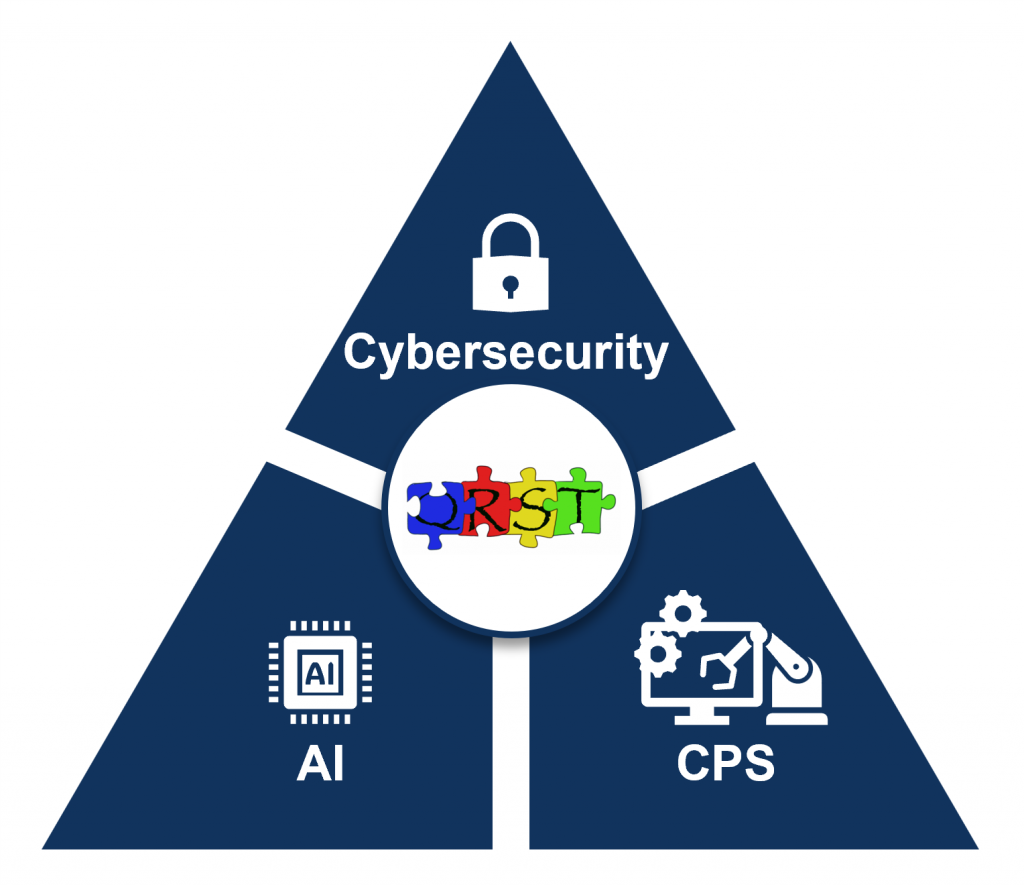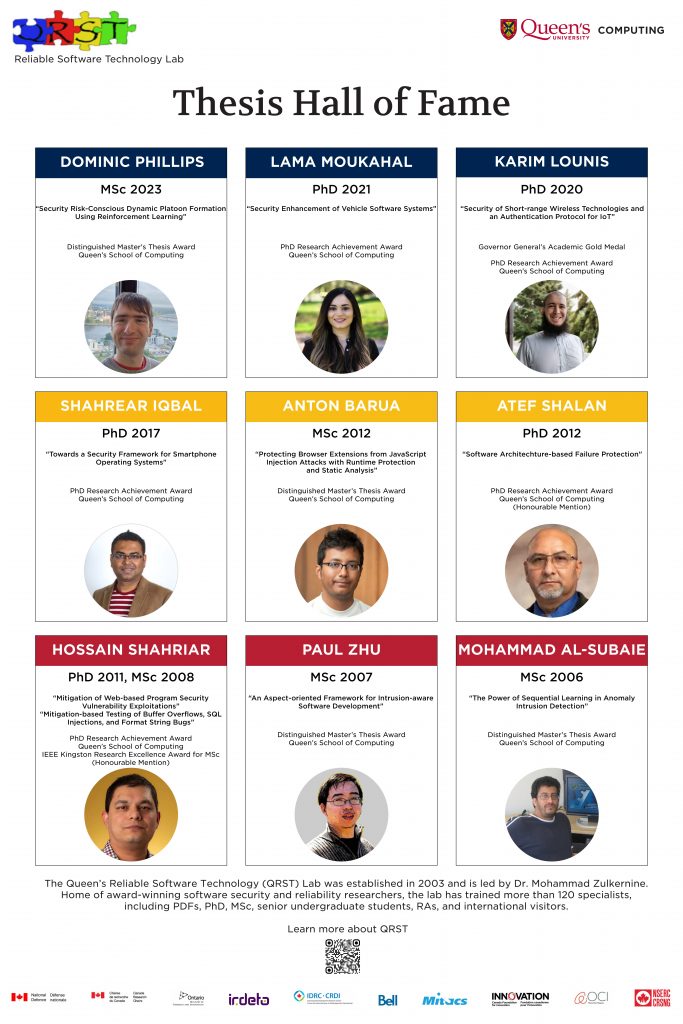
Selected Projects
- Cyber Physical Systems (CPS) Security and Privacy: Strengthening the resilience of integrated CPS against cyber threats while maintaining rigorous security and privacy safeguards.
- Security for Connected and Autonomous Vehicles: Designing sophisticated protection mechanisms to defend connected and autonomous vehicles from evolving cybersecurity vulnerabilities.
- Vehicle Software Engineering (VSE): Developing robust, secure software that enhances vehicle safety, performance, and user experience, alongside building intrusion aware architectures for cloud and IoT ecosystems.
- Artificial Intelligence (AI) Driven Security: Leveraging AI to automatically detect, classify, and mitigate cyber intrusions across diverse platforms, while also ensuring the security and trustworthiness of AI systems themselves.
- Privacy Preserving Machine Learning (PPML): Advancing PPML methods that support secure, privacy conscious anomaly detection without compromising sensitive data.












Members
Principal Investigator
Postdoctoral Fellows

Co-supervisor: Dr. Jianbing Ni
PhD Students

Co-supervisor: Dr. Jianbing Ni

Co-supervisor: Dr. Ding


Co-supervisor: Dr. Anwar Hossain


Co-supervisor: Dr. Jianbing Ni

Co-supervisor: Rongxing Lu

Co-supervisor: Rongxing Lu
Master’s Students

Co-supervisor: Dr. Furkan Alaca

Co-supervisor: Dr. Furkan Alaca
Former Postdoctoral Fellows
Completed PhD and Master’s Theses
- Youssef Yamout, Methods and Tools for Secure Smart Aging Care Systems, 2025.
- Aleem Alvi, Security Pattern Detection in Software Architectures, 2025.
- Amin Fakhereldine, Security of Communications in Communication-Based Train Control Systems, 2025.
- Mohammed Abdelmaguid, Security prediction and forecasting for trust management systems in VANETs, (co-supervised), 2024.
- Anika Anwar, Cooperative and Decentralized Defense in Autonomous Vehicle Networks, 2023.
- Abu Faisal, Design and Implementation of A Secure Communication Architecture, 2022.
- Maryam Davari, Toward More Effective Management of Attribute-Based Access Control Policies, 2022.
- Farnood Ghazvini, Mobile Malware Detection and Mitigation, 2022.
- Saeed Shafieian, Methods for Low Footprint Intrusion Detection Using Ensemble Learning, 2022.
- Lama Moukahal, Security Enhancement of Vehicle Software Systems, 2021. (Outstanding PhD Research Achievement Award of the School of Computing, 2022)
- Karim Lounis, Security of Short-Range Wireless Technologies and an Authentication Protocol for IoT, 2020. (Governor General Award, Outstanding PhD Research Achievement Award of the School of Computing, 2021)
- Bodrul Alam, Towards Reliability Evaluation and Integration in Cloud Resource Management, 2020.
- Marwa Elasyed, Advancing Security Services for Cloud Applications, 2018.
- Mohannad Alswailim, Preserving Accuracy and Privacy in Participatory Sensing Systems, (co-supervised), 2018.
- Shahrear Iqbal, Towards A Security Framework for Smartphone Operating Systems, 2017. (Outstanding PhD Research Achievement Award of the School of Computing, 2018)
- Eslam Abdallah, Defending Against DDoS and Unauthorized Access Attacks in Information Centric Networking, (co-supervised), 2017.
- Umair Khan, Embedding Security Monitors in Software Components, 2014.
- Atef Mohamed, Software Architecture-Based Failure Prediction, 2012. (Honorable mention, Outstanding PhD Research Achievement Award of the School of Computing, 2013)
- Hossain Shahriar, Mitigation of Web-Based Program Security Vulnerability Exploitations, 2011. (Outstanding PhD Research Achievement Award of the School of Computing, 2011)
- Shaila Anuva, LIDIT: Low-Latency Intrusion Detection in IoMT Devices using TinyML, (co-supervised), 2025.
- Nadia Rubaiyat, SRED: Secure and Robust Emotion Detection for Advanced Driver Assistance Systems, (co-supervised), 2025.
- Abrar Kazi, Novel Norms for Pruning Convolutional Neural Networks, (co-supervised), 2025.
- Arash Gholami, A Smartwatch-Based Continuous Authentication System, (co-supervised), 2024.
- Mackenzie Tummers, Detecting Intrusions in CBTC Systems with Mixed-Mode Operations, 2024.
- Rafsun Islam, Detection of Cyberbullying in Social Media Texts Using Explainable Artificial Intelligence, 2023.
- Tashaffi Yeasar, Pulse-to-Pair: A Heartbeat-based Authentication Method for Body Area Networks, 2023.
- Dominic Phillips, Security Risk-based Dynamic Platoon Formation Using Reinforcement Learning, 2023. (Distinguished Master’s Thesis Award in the School of Computing, 2024)
- Ryan Kerr, Combined Reinforcement Learning & Symbolic Logic for Autonomous Cyber Operations, 2023. (co-supervised)
- Yunke Liu, Privacy and Regulatory Compliance in Central Bank Digital Currency, (co-supervised), 2022.
- Aawista Chaudhry, A Framework for Modeling Advanced Persistent Threats in Intelligent Transportation Systems, 2021.
- Scarlett Taviss, Asm2Seq: Explainable Assembly Code Functional Summary Generation, (co-supervised), 2021.
- Syed Hridoy, Lightweight Authenticated Encryption for Vehicle Controller Area Network, 2020.
- Najmeh Arabi, Exploring Reinforcement Learning Driven Cyber-Attacks on Intelligent Transportation Systems, (project), 2020.
- Juan Wang, A Secure Keyless Entry System Based on Contextual Information, 2019.
- Hasheem Ilyas, Towards Developing Secure IoT Applications Using Security Patterns, (project), 2019.
- Swawibe Alam, Securing Vehicle Electronic Control Unit (ECU) Communications and Data, 2018.
- Arafa Anis, Securing Web Applications with Secure Coding Practices and Integrity Verification, 2018.
- Jia Wan, Android App Protection through Anti-tampering and Anti-debugging Techniques, 2018.
- Pushpanjali Chauhan, A Signature-Based Approach for Detecting DoS and Fuzzy Attacks on Vehicle CAN Bus, (project), 2018.
- Lovleen Cheema, Machine Learning for In-Vehicular Intrusion Detection, (project), 2018.
- Omar Hreirati, An Adaptive Dataset for Android Malware Research, (project), 2018.
- Siam Hasan, A Protocol Specific Constraint-based Intrusion Detection System, (co-supervised), 2017.
- Maryam Davari, Classifying and Predicting Software Security Vulnerabilities Based on Reproducibility, 2016.
- Saikat Das, A Cloud-based Framework for Security Analysis of Browser Extensions, 2016.
- Pranav Ranjan, Techniques to Detect and Prevent Changes in DOM Tree, (project), 2016.
- Tianbin Jiang, Security Enhancement in Virtualization Memory Management, (project), 2016.
- David Wang, An Anti-debug System for JavaScript Protection,(project), 2015.
- Amin Khademi, Browser Fingerprinting: Analysis, Detection, and Prevention at Runtime, 2014.
- Hana Hashemi, A Hybrid Approach to Detect Tabnabbing Attacks, 2014.
- Michael Godfrey, On the Prevention of Cache-Based Side-Channel Attacks in a Cloud Environment, 2013.
- Dhyanesh Chaudhari, A Component of Ranking Framework for More Reliable Software, 2013
- Anton Barua, Protecting Browser Extensions from JavaScript Injection Attacks with Runtime Protection and Static Analysis, 2012. (Distinguished Master’s Thesis Award in the School of Computing, 2013)
- Umme Hunny, Orthogonal Security Defect Classification for Secure Software Development, 2012.
- Amatul Mohsina, DESERVE: A Framework for Detecting Program Security Vulnerability Exploitations, 2011.
- Xiaofeng Young, Monitoring Components by Using Aspects and Contracts in Wrappers, 2010.
- Istehad Chowdhury, Using Complexity, Coupling, and Cohesion Metrics as Early Indicators of Vulnerabilities, 2009.
- Hossain Shahriar, Mutation-Based Testing oF Buffer Overflows, SQL Injections, and Format String Bugs, 2008. (Honorable mention, IEEE Kingston Research Excellence Award for MSc, 2009)
- Gias Uddin, Development and Automatic Monitoring of Trust-Aware Service-Based Software, 2008.
- Vivian Kuang, A Dependable Network Intrusion Detection System Using the CSI-KNN Algorithm, 2007.
- Yonghua You, A Defense Framework for Flooding-Based DDoS Attacks, 2007.
- Zhi Zhu, An Aspect-oriented Framework for Intrusion-Aware Software Development, 2007. (Distinguished Master’s Thesis Award in the School of Computing, 2008)
- Feroz Raihan, AsmLx Based Intrusion-Aware Software Systems, 2006.
- Mohammed Hussein, A Framework Utilizing UML for the Specification of Intrusion Detection-Aware Software, 2006.
- Mohammad Al-Subaie, The Power of Sequential Learning in Anomaly Intrusion Detection, 2006. (Distinguished Master’s Thesis Award in the School of Computing, 2007)
- Jiong Zhang, Network Intrusion Detection Systems Using Random Forests Algorithm, 2005.
- Matthew Graves, Detecting Intrusions by Translating AsmL Specifications to Snort Rules, 2005.
- Pradeep Kannadiga, DIDMA: A Distributed Intrusion Detection System Using Mobile Agents, 2005.















